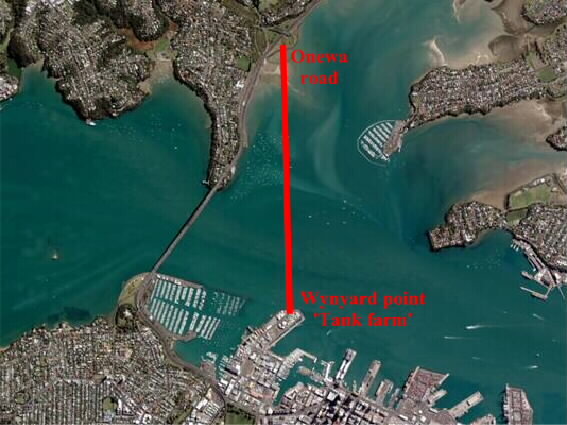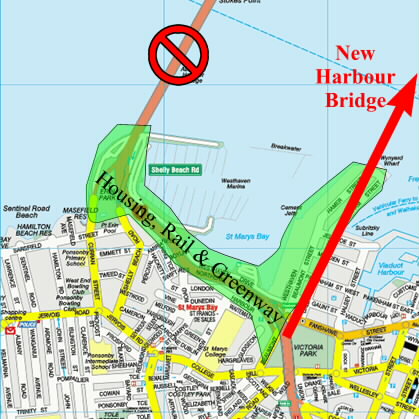My Glaswegian anarchist grandfather would have enjoyed Kiwi Foo Camp. He thought you only needed the bare minimum of rules, and then everybody would magically co-operate for the common good. For technology geeks, at any rate, it turns out that he was absolutely right.
Kiwi Foo Camp was a triumph of applied anarchism, and one of the most enjoyable gatherings that I've ever attended. All of the seminars were excellent -- but the most excellent thing was that each and every seminar demonstrated the power of the new electronic age. From the international co-operation required to build Debian Linux to websites that allow greater participation in the democratic process, the anarchism of the internet is enabling society to interact and share ideas in radically new ways.
It was, as I burbled relentlessly to Karl von Randow and a group of his new friends, comparable to the influence of the printing press on the Reformation. Only after the conference had finished did I decode their polite but mystified silence. Errr... what I actually meant, guys, was the influence of the printing press on the Enlightenment. Funny how easily you can get those two confused.
One of the seminars was so inspiring that David Slack and I formed our own political lobby group. Operating under the snappy acronym ISODWOPA (International Society of Davids Working on Public Address) the aims of the group are fairly simple:
- To gain greater political representation for people called David who work for Public Address.
- To get off our arses and make a submission to the select committee dealing with the new copyright legislation.
Personally I thought that the 'I' in ISODWOPA should have stood for 'Intergalactic' -- but the other David was adamant that 'International' was sufficient. So it won't be my fault if Earth is contacted by an alien civilization, and we have to spend a fortune on re-branding.
Other enjoyable seminars were given by: Russell Brown, David Slack, and the multi-talented Mark Cubey on "Stories as the New Data"; the deep-thinking Don Christie on "The Importance of Open Infrastructure to our Economy"; and the remarkable Rob McKinnon on his project TheyWorkForYou.co.nz. As a bare minimum, Rob should have a statue erected in his honour for public service to New Zealand voters, and everyone should visit his website so that they can better track the shenanigans of their MPs.
Jen Hay's seminar on New Zealand English raised an interesting question. Is it just me, or do chicks who speak five languages, have an in-depth knowledge of UNIX, and can program a computer with one hand tied behind their back... well, you know, seem kind of hot? And, if it's not an even more inappropriate question: would marriage be a possibility?
Auckland City Councillor Richard Simpson's seminar had relevance to a recent Southerly post in which I made myself unpopular by saying:
Auckland's tragedy is not so much what it is -- a dysfunctional hotchpotch of suburbs with a lousy transportation system -- but, rather, that it falls so far short of the great metropolis that it could have been. Given Auckland's natural features it should be the most beautiful city in the world, but it's only mildly pretty at best.
As the chairman of Auckland City Council's Transport and Urban Linkages Committee, Richard Simpson intends to make me eat my words. Frankly, I'd be delighted to eat both my words and my laptop if his stunning plans become a reality for Auckland.
It's no exaggeration to describe Richard as a visionary genius -- his seminar had my mouth hanging open in admiration at his ideas. He is exactly the sort of local body politician that Auckland needs to reach its potential as an international city. His innovative solution for Auckland's sports stadium problem has already received positive coverage in the Herald, as well as a promised $200 million in investment from a consortium of private companies.
<div style="text-align: center"Above: Richard Simpson's vision for a stadium at Carlaw park.
[click to see a larger image]
Richard explained that his solution involves a comparatively straightforward revamp of Carlaw park -- but the revolutionary concept is the way in which the stadium will become connected to the city. He proposes a travelator in the disused WW2 tunnel which runs under Albert park from the end of High street. The tunnel would be linked to the stadium via an "art bridge" which spans across Stanley street.
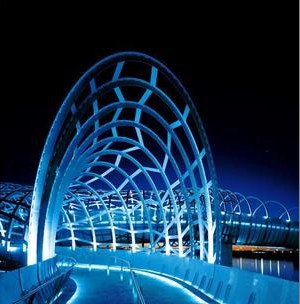
Above: Richard Simpson envisages an "art bridge" over Stanley street (perhaps similar to the Webb bridge in Melbourne).
The new stadium would also help relieve the congestion problems in Auckland city by providing 10,000 new parking spaces. Commuters would take the Stanley street motorway off-ramp to Carlaw park, and then catch the travelator directly into High street. The proposal has the added bonus of connecting the Auckland domain to the heart of the city -- meaning that lunch in the park is only a short travelator ride away.
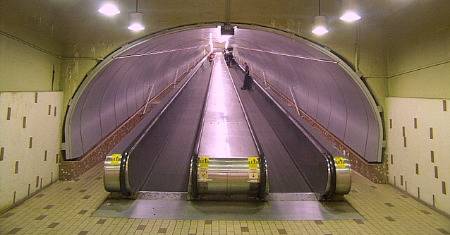
Above: Richard Simpson envisages a travelator connecting Carlaw Stadium to High Street via the existing tunnel under Albert park.
I was amazed by some of the information that Richard presented in his seminar. Did you know that metal fatigue in the existing 'Nippon clip-on' means that the Auckland harbour bridge has only a decade or so of remaining life? Luckily for Aucklanders this is another problem to which he has found a brilliant solution.
[click to see a larger image]
Richard proposes a billion-dollar replacement bridge which will span the harbour from the Wynyard point 'Tank farm' to Onewa road. This frees up the land under the existing bridge on-ramps, and makes available for sale nearly one-and-a-half billion dollars worth of new real estate in St Mary's bay and Northcote point. The net result being that Auckland gets a new bridge without costing the ratepayers a cent.

Above: Richard Simpson envisages an 'iconic' Harbour bridge (perhaps similar to the El Alamillo bridge in Spain).
Richard explained the importance of developing an "iconic" bridge design, and suggested that the El Alamillo bridge in Spain might be a good starting point. He also stressed the need for the new bridge to cater for pedestrians, cyclists, and a light rail link (in addition to cars). I felt like cheering. Who would've thought a city councillor could contemplate such revolutionary thoughts?
[click to see a larger image]
According to Richard's plan, the majority of the new land in St Mary's bay will be zoned for high density housing -- but some will also be set aside for a waterfront park. This will provide a seamless greenway stretching from the central city through to Victoria park, the waterfront, and the Westhaven marina. Richard also proposes to develop a light rail link that runs from the Western bays to Ponsonby, and then along the waterfront to St. Heliers. Eventually he expects that the Northern Busway will be upgraded to light rail as well.
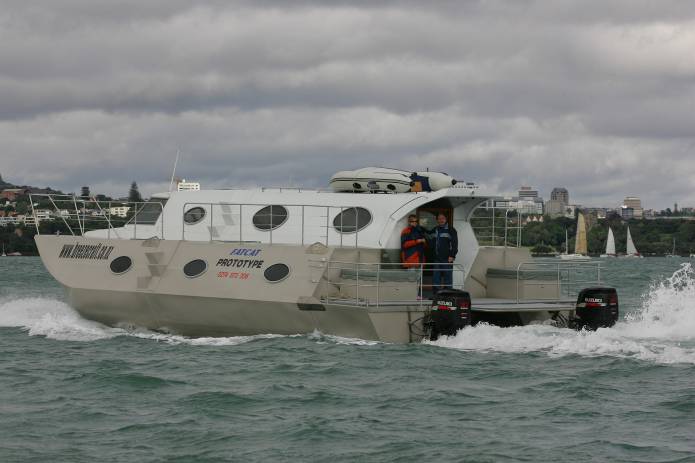
Above: Richard Simpson envisages an up-sized ferry fleet using New Zealand made vessels such as this Breeze Fatcat.
Are you stunned into silence yet? What about a rail link to the airport? Well, probably not, says Richard. He thinks a ferry link would be a better idea. In fact, he suggests up-sizing the current ferry network, and connecting it via a canal to the Manukau harbour. Sounds impossible? Well, it turns out that this type of canal has been planned since the 19th century.
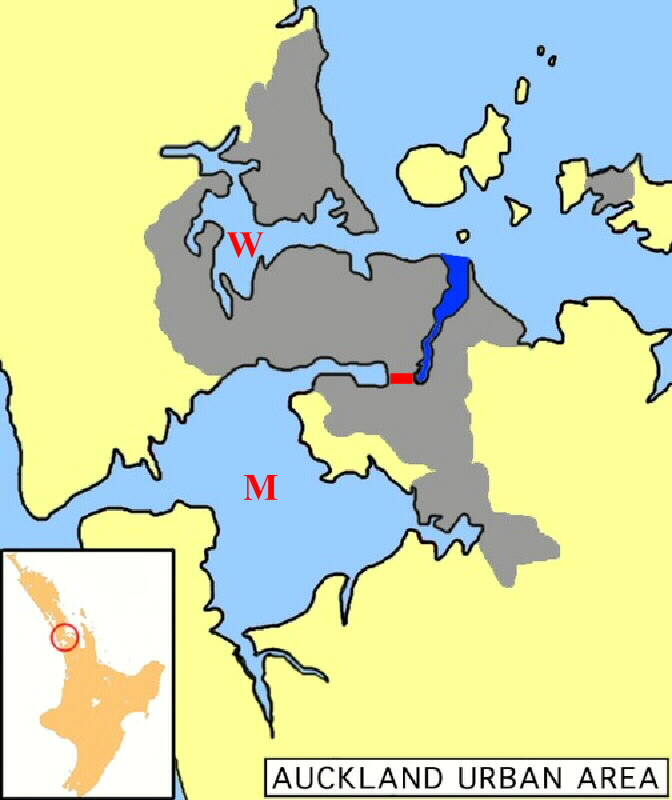
Above: A 'canalized' Tamaki river links the Waitemata and Manukau harbours (M = Manukau Harbour; W = Waitemata Harbour; Tamaki river shown as dark blue; canal extension shown in red).
The proposed Waitemata-Manukau canal would make use of the Tamaki river, which only requires a couple of kilometres of new waterway to reach the Manukau. The 1966 Encyclopaedia of New Zealand describes a similar canal scheme in an article on the Manukau harbour (in which, curiously, it reports the construction proposal as a done deal).
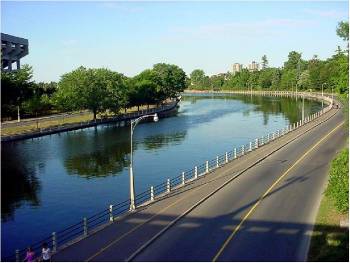
Above: How the Waitemata-Manukau canal might look.
Richard's proposed ferry link would put the airport only twenty minutes away from the heart of the city. And, as he points out, it would also give visitors a unique "gateway experience" to Auckland. According to Richard, a canal would be no more expensive to construct and operate than a rail link. This is especially true if you consider the tidal potential between the two harbours, and the likely revenue from a tidal-to-electricity power station.

Above: Richard Simpson envisages tidal turbines on the new Waitemata-Manukau canal.
I left the seminar with my faith in the unimaginativeness of Auckland's town-planning severely shaken. In Richard's seminar it all seemed so possible, and as I drove back from Kiwi Foo Camp the landscape was overlaid with images of how fantastic Auckland might become in the future.
That night I visited my other (non-anarchist) grandfather, and told him about Richard Simpson's seminar. My grandfather listened with mounting scepticism. He then proceeded to pour cold water on my enthusiasm with a statement that began: "I went to a lot of trouble when I was in the air force to bring home a bomb..." and ended with the words "... and that's why Auckland will never have visionary town-planning or beautiful architecture. The council couldn't organize a piss-up in a brewery!"
It seems to me that it's up to the council and citizens of Auckland to prove my grandfather wrong. For God's sake, Aucklanders, re-elect Richard Simpson! And what about nominating him for mayor? We could do with a Foo-camper in charge!
Acknowledgement:
I'd like to extend my thanks to Nat Torkington and Russell Brown for their kind invitation to Kiwi Foo Camp. May I say that Nat not only organizes a great conference, but that he (and his lovely wife, Jenine) are an enviably talented musical duo as well.
NOTE:
Any inadvertent errors in this article are doubtless my own, and should not be attributed to Cr. Richard Simpson (or any other attendee of Kiwi Foo Camp).

